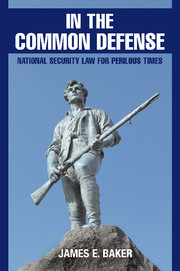Book contents
- Frontmatter
- Contents
- Acknowledgments
- Abbreviations
- Introduction
- 1 Perilous Times: Describing the Threat
- 2 The Meaning of National Security
- 3 National Security Law
- 4 Constitutional Framework
- 5 Electronic Surveillance: Constitutional Law Applied
- 6 National Security Process
- 7 Intelligence
- 8 Use of Military Force
- 9 Homeland Security
- 10 The National Security Lawyer
- Attachments
- Notes
- Index
2 - The Meaning of National Security
Published online by Cambridge University Press: 26 July 2009
- Frontmatter
- Contents
- Acknowledgments
- Abbreviations
- Introduction
- 1 Perilous Times: Describing the Threat
- 2 The Meaning of National Security
- 3 National Security Law
- 4 Constitutional Framework
- 5 Electronic Surveillance: Constitutional Law Applied
- 6 National Security Process
- 7 Intelligence
- 8 Use of Military Force
- 9 Homeland Security
- 10 The National Security Lawyer
- Attachments
- Notes
- Index
Summary
INVOKING NATIONAL SECURITY
There is no more important assertion of policy validation than an assertion of national security. Within the law, invocation of the phrase carries important substantive and procedural implications. Where the president acts in the interest of national security, he can assert the constitutional authority to do so as chief executive and commander in chief and with all the authority the president possesses over the conduct of foreign affairs. This has obvious ramifications in a constitutional climate where presidents have long asserted authority to use force as commander in chief, without express congressional authorization, and to employ the instruments of intelligence without legislative or judicial review.
Like the president, the Congress also acts with additional constitutional authority in the area of national security. Thus, in addition to the power of the purse, the take care clause, and the “legislative Powers,” the Congress has express authority to “declare war,” “to lay and collect taxes … to … provide for the common Defense,” “to raise and support Armies,” and “to provide and maintain a Navy.” From a lawyer's perspective, this means that invocation of national security will often put questions of law into that often indeterminate twilight of constitutional law involving the separate and shared powers of the political branches.
Invocation of national security also increases the statutory instruments available to the president. “National security” is the substantive threshold for many, if not most, of the statutorily authorized national security tools.
- Type
- Chapter
- Information
- In the Common DefenseNational Security Law for Perilous Times, pp. 13 - 22Publisher: Cambridge University PressPrint publication year: 2007



